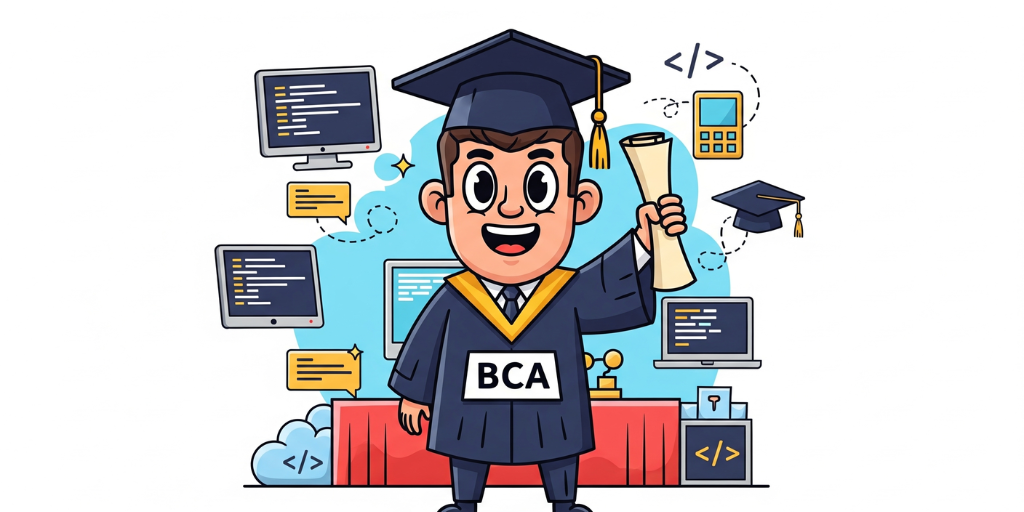Technology has emerged as the pillar of new-age industries, ranging from healthcare to banking, from education to e-commerce. With companies going online, the need for IT professionals has boomed across the globe. Among undergraduate courses that have a direct entry into this promising sector is the Bachelor of Computer Applications (BCA).
Designed for students passionate about computers, coding, and digital innovation, this course builds a strong foundation in software development, databases, programming, and IT management. For those who dream of working in tech giants, building apps, or launching their own IT ventures, BCA truly serves as a gateway to the IT world.
What is Bachelor of Computer Applications?
Bachelor of Computer Applications (BCA) is a three-year undergraduate course in computer science and applications. Unlike other engineering degrees that go deep into technical theories, BCA focuses more on practical knowledge and software skills needed for actual IT work.
During the course, students learn how to design, develop, and maintain software applications. At the end of the course, graduates are well-placed to start work as software developer, web designer, system analyst, and database administrator.
Eligibility and Admission Process
All Indian and foreign universities follow similar eligibility criteria for BCA:
- Completion of 10+2 (Class 12) from a recognized university
- Minimum 45–50% aggregate percentage marks (some relaxation for reserved categories)
- Mathematics or Computer Science in 12th is given preference but not always required
Entrance is either merit-based or based on entrance exams (university-wise)
Topics Taught in BCA
The curriculum of BCA is such that both theoretical knowledge and hands-on expertise are imparted. Some common topics are:
- Programming Languages (C, C++, Java, Python)
- Data Structures and Algorithms
- Database Management Systems (DBMS)
- Operating Systems
- Software Engineering
- Computer Networks
- Web Development & Internet Technologies
- Mobile Application Development
- Cloud Computing & Cybersecurity
- Artificial Intelligence and Machine Learning (advanced modules in subsequent semesters)
In addition to these, students also engage in live projects, internships, and seminars that offer exposure to industry practices.
Skills You Acquire Through BCA
Pursuing a Bachelor of Computer Applications is not merely about acquiring a degree, it's about gaining meaningful skills sought by employers.
- Programming Expertise – Coding in various languages
- Problem-Solving – Breaking down issues and developing IT solutions
- Database Handling – Designing and managing big data systems
- Web & App Development – Developing websites and mobile apps
- Communication & Teamwork – Collaborative working in IT environments
- Adaptability – Keeping oneself abreast of new technologies
Career Opportunities After BCA
BCA provides access to a variety of career opportunities in both private and public sectors.
Popular Job Roles:
- Software Developer – Developing and testing applications for companies and users
- Web Developer – Creating responsive and dynamic websites
- Mobile App Developer – Developing applications for Android & iOS platforms
- Database Administrator – Organizational data management and security
- System Analyst – Analyzing and optimizing IT systems
- Cybersecurity Analyst – Securing data from cyber attacks
- IT Consultant – Consulting businesses for technology solutions
Industries Employing BCA Graduates:
- IT Services & Software Development
- E-commerce & Startups
- Banking & Finance (FinTech)
- Healthcare Technology
- Government IT Departments
- Telecommunications
- Education Technology (EdTech)
Salary Trends for BCA Graduates
The pay scale after a Bachelor of Computer Applications differs depending on skills, location, and job designation.
- India: Recruits can get ₹3–5 LPA, whereas certified professionals can get ₹8–12 LPA or more.
- Abroad: The pay scale is from $50,000 to $80,000 per annum for freshers, with fast progress as experience accumulates.
Certifications in cloud computing, data science, cybersecurity, or AI can significantly boost pay scales.
Higher Education After BCA
Numerous students opt for higher studies after BCA to consolidate their skills and professional prospects. Some of the preferred choices are:
- Master of Computer Applications (MCA) – Sophisticated software and IT skills
- MBA in Information Technology – Business management coupled with IT skills
- Postgraduate Diplomas – Specializations in AI, data analytics, cloud computing
- International Certifications – AWS, Microsoft Azure, Google Cloud, Cisco CCNA
Why Opt for BCA as a Career?
Here's why BCA is rated among the top courses for future IT professionals:
- Industry-Relevant – Prepares students directly for IT careers
- Affordable & Accessible – Lower course fees than engineering courses
- High Employability – IT industry regularly hires BCA graduates
- Global Opportunities – Job opportunities in India and abroad
- Entrepreneurial Scope – Most BCA graduates start their own startups or freelance businesses
The Future Scope of BCA in 2025 and Beyond
The IT industry keeps expanding at a fast pace, driven by innovations like AI, machine learning, blockchain, cybersecurity, and big data. Statistics indicate that the job market for skilled IT professionals will expand by 20–25% by 2030.
This implies that students with a Bachelor of Computer Applications will not only get robust opportunities today but also long-term professional development in new areas like:
- Artificial Intelligence
- Cloud Computing
- Cybersecurity
- Data Science & Analytics
- Internet of Things (IoT)
- Mobile and Web Application Development
Conclusion
The Bachelor of Computer Applications is not merely a degree, it is a stepping stone to the world of IT. With an ideal mix of theory, programming practice, and industry exposure, it prepares students to boldly enter one of the world's fastest emerging industries.
Whether you plan to become a software developer, work towards higher studies such as MCA or MBA, or start your own IT business, BCA is the correct starting point to shape your future.
With industries increasingly adopting digital transformation, opting for BCA in 2025 not only means a degree, but a career that will remain relevant into the future.



